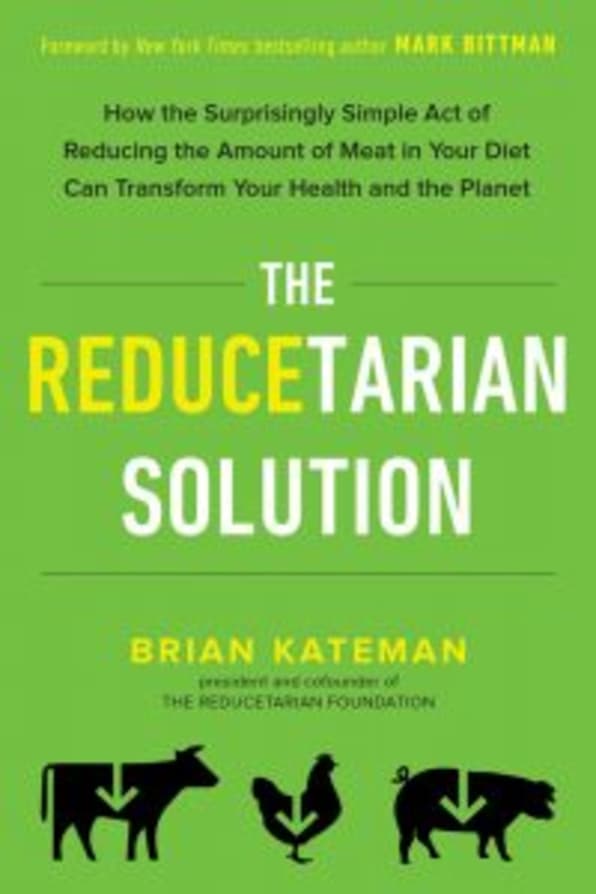Eating Meat Is Bad For The Planet: But What About Just Eating Less Meat?
Around seven years ago, Brian Kateman was eating a hamburger on a plane as he flew to a conference where he was presenting research on tree ring data and climate change that he had conducted for a college class. “I was always the guy on campus who identified as an environmentalist, telling people to take shorter showers and carry around reusable water bottles,” Kateman tells Fast Company. But until his friend looked over, saw Kateman chowing down on ground beef while poring over notes on the declining state of our planet, and tossed him The Ethics of What We Eat—Peter Singer’s seminal book that explores the impact our food choices have on animals, ourselves, and the environment—Kateman never made the connection between meat consumption and climate change.

That moment, Kateman says, began a real shift for him. Learning that large-scale meat production accounts for around 14.5% of global greenhouse gas emissions, Kateman became a vegetarian shortly thereafter. But the strictures of a completely meat-free life chafed at him. One piece of turkey at Thanksgiving, Kateman reasoned, would not dig a deep enough carbon footprint to negate the benefits of every other meat-free meal he consumed. With the idea that any variety of meat reduction—whether it be veganism, vegetarianism, or just deciding to cut out meat one day a week—still benefits the planet, Kateman founded the Reducetarian Foundation in 2014 while studying conservation biology at Columbia University. In The Reducetarian Solution, a new anthology edited by Kateman, thought leaders from Singer to economist Jeff Sachs to environmentalist Bill McKibben sound off on the reasons why less meat is a good thing for humans and the planet we inhabit—and why it’s more important to focus on gradual cutbacks and their benefits than forcing yourself into a category like vegan or “flexitarian,” where the focus might drift more toward obeying a set of rules than focusing on a specific global outcome.
The reasons, according to The Reducetarian Solution, are legion. The anthology contains no less than 72 short essays, organized into three overarching categories of mind, body, and planet that traverse every possible argument for meat reduction, from the moral-ethical (large-scale livestock operations expose animals to inhumane conditions), to the health and productivity focused (red meat is linked to sluggishness, heart disease, and cancer), to the environmental (meat production pollutes the air and is an inefficient use of resources). “I love the idea of all these different thought leaders coming together and being united on a single front,” Kateman says. “We don’t have to agree on everything. We don’t have to agree on what the ideal reduction is; we don’t have to agree on the most important cause areas. But we all agree that reducing societal consumption of animal products absolutely has to happen. And we’ll reach that common goal much faster if we work together than continuing to work in silos.”
Reducetarianism, Kateman says, differs crucially from categories like “flexitarian” and “semi-vegetarian” because while the latter describe people who primarily consume plant-based diets and occasionally “cheat” on their commitments (a concept for which Kateman has little patience—punishing yourself for taking the occasional bite of burger distracts from the fact that eating less meat overall is still a net positive), reducetarianism aims for inclusivity, and an acknowledgement, as Kateman writes in the anthology, “that people are at different stages of willingness and commitment to eating less meat.”
The most strident vegans and vegetarians, Kateman says, advocate for a complete end to global meat consumption. Kateman recognizes that at least for the time being, that is an impossible request for various reasons, not the least of them being the cultural inertia of meat consumption: An especially fascinating essay by author Anastacia Marx de Salcedo navigates the influence of the military on linking carnivorousness with masculinity. And for some people, it’s a matter of habit. For an example of this, Kateman looks to his parents, whom he estimates eat around 200 pounds each of meat per year, shy of the 270 pounds the average American puts away each year, but still 100 pounds over the global average. “If you think about it, getting people like my parents to cut back 20%—for say, a reduction of 40 pounds per year—that’s actually a greater win for the planet than getting someone who eats maybe five pounds per year to go completely vegetarian,” Kateman says. “I think we have to think about this in terms of societal consumption of animal products rather than pinning it on one particular person.”
While the majority of the essays in the book are written through the lens of the U.S., the philosophies have a global application. China now consumes over a quarter of the world’s meat, despite new governmental dietary restrictions aiming to cut the country’s meat consumption in half by 2030 (and reduce associated greenhouse gas emissions by 1 billion tons). One could much more easily see that goal being accomplished if everyone rolls back their individual consumption than if half of China spontaneously goes vegetarian.
Even for those well-versed in the arguments in favor of the consumption of meat reduction, like Kateman, The Reducetarian Solution will likely illuminate a previously unconsidered angle. For Kateman, that happened when he read the essay by Dawn Moncrief, the founding director of A Well-Fed World, an organization aiming to tackle world hunger by cutting back on animal consumption. Moncrief’s essay slices into the livestock industry’s crop-use inefficiencies, describing how 25 calories in the form of feed are needed to produce one calorie of edible beef. “Just imagine if you were at a restaurant and saw someone present you with 25 plates of food, then they threw out 24 of those plates and you were left with a single plate,” Kateman says. “The restaurant would be in an uproar, but that’s what happens every day on factory farms in terms of having to feed these animals.” It’s a difficult concept to grasp, Kateman says, because we are so removed from that process, but reading Moncrief’s essay brought the inefficiencies into sharp relief in the context of global hunger.
The Reducetarian Solution anthology, Kateman says, is neither a prescription nor a fix for livestock-industry produced climate change. But the variety of approaches and perspectives contained in the book testify to how open the avenues are for bringing about this kind of change. In late May, a month after the release of the anthology, the Reducetarian Foundation will host its first summit in New York City to tackle the question of, “How do we as individuals, organizations, communities, and societies work to systematically decrease meat consumption?”
While much of this change will begin at the level of individual choice and demand, Kateman points to the Impossible Burger, which uses plant-based ingredients to create a meat-like but entirely vegetarian patty, as one graceful off-ramp from our cultural meat dependency. In a way, the Impossible Burger encapsulates the ethos of reducetarianism: It meets people where they are, and offers an alternative to meat that could perhaps, over time, become a habit. Whether you’re most concerned with your personal health or with the fate of the planet, The Reducetarian Solution shows, Kateman says, that “each time we sit down to eat is an opportunity to make a vote for the issues we care about.”
(101)














